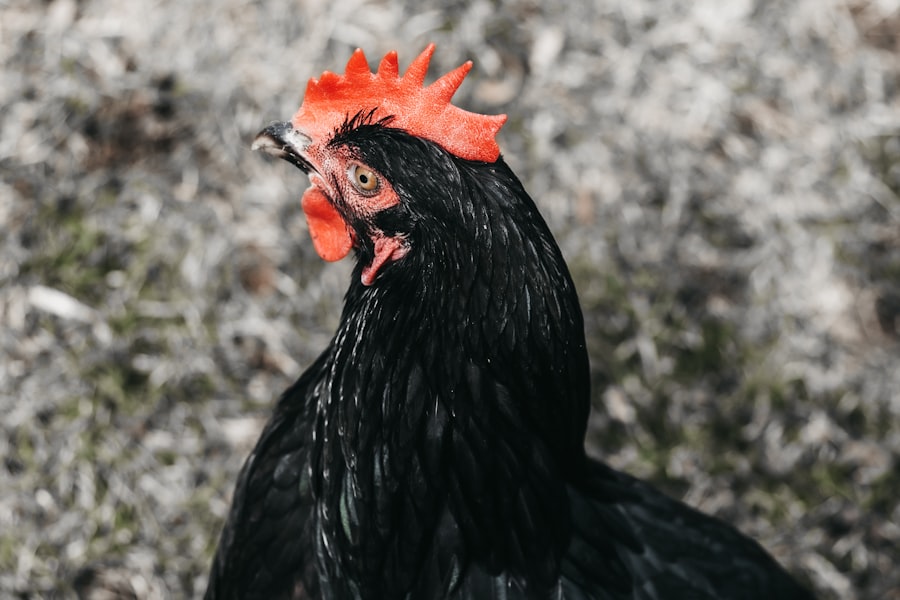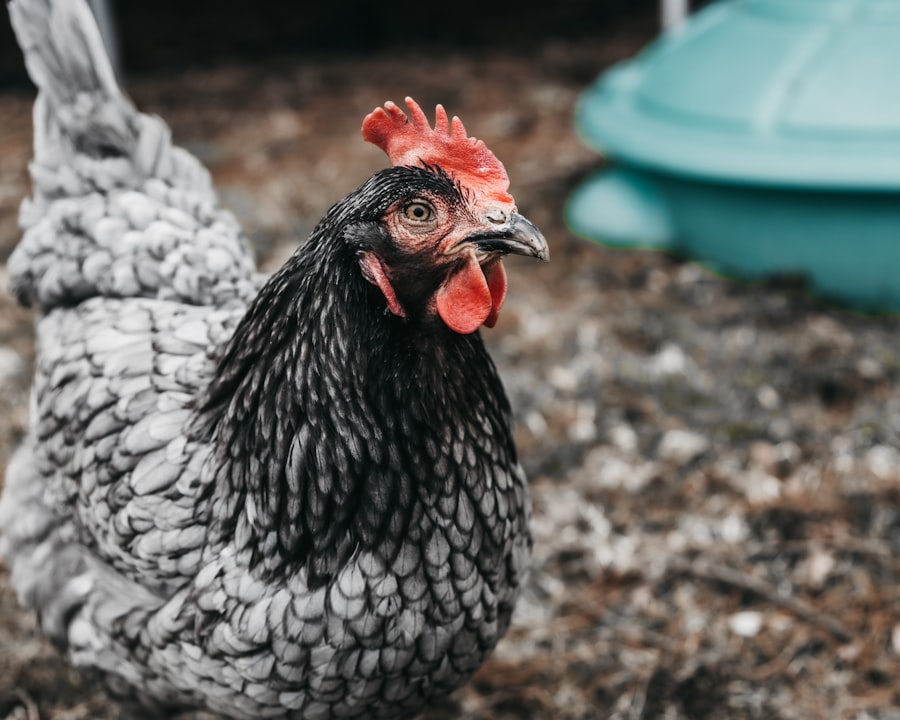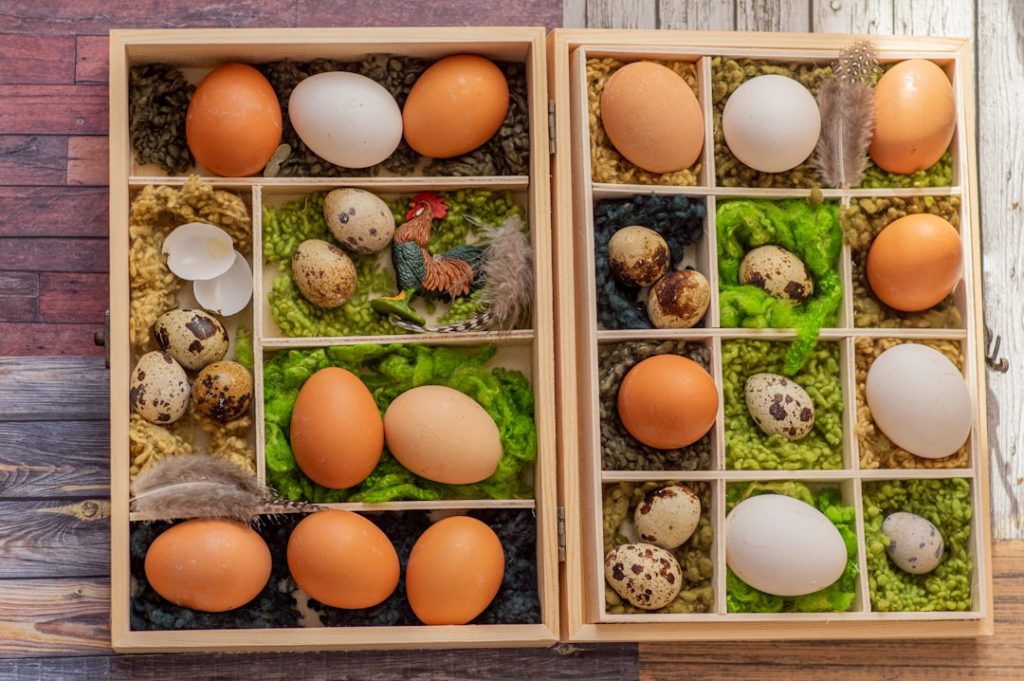Providing a safe and comfortable coop is crucial for raising chickens. The coop must be secure against predators like foxes, raccoons, and birds of prey, with sturdy walls, a secure roof, and locks on doors and windows. Proper ventilation is essential for air circulation, ammonia reduction, and temperature regulation.
Insulation helps maintain comfortable temperatures year-round. The coop should include comfortable nesting boxes lined with clean bedding, such as straw or wood shavings, for hens to lay eggs. Perches are necessary for roosting at night, and ample space should be provided for chickens to move and stretch their wings.
These elements are vital for ensuring the health and well-being of chickens in their living environment.
Table of Contents
- 1 Providing Nutritious and Varied Diet
- 2 Allowing for Ample Space to Roam and Explore
- 3 Ensuring Regular Socialization with Other Chickens
- 4 Implementing Enrichment Activities
- 5 Maintaining Clean and Hygienic Living Conditions
- 6 Monitoring and Addressing Health and Wellness Needs
- 7 FAQs
- 7.1 What are some tips for keeping backyard chickens happy?
- 7.2 How much space do backyard chickens need to be happy?
- 7.3 What should I feed my backyard chickens to keep them happy?
- 7.4 How can I provide enrichment for my backyard chickens?
- 7.5 What are some common signs that backyard chickens are happy and content?
Key Takeaways
- Provide adequate ventilation and insulation in the coop to ensure a safe and comfortable environment for the chickens.
- Offer a balanced diet that includes a variety of grains, greens, and protein sources to meet the nutritional needs of the chickens.
- Allow for ample space in the coop and outdoor area for the chickens to roam, scratch, and explore.
- Encourage regular interaction and socialization among the chickens to promote their well-being and reduce stress.
- Implement enrichment activities such as hanging treats or providing toys to keep the chickens mentally and physically stimulated.
- Keep the coop and surrounding area clean and free from pests to maintain hygienic living conditions for the chickens.
- Monitor the health and wellness of the chickens regularly and address any issues promptly to ensure their overall well-being.
Providing Nutritious and Varied Diet
Foundation of a Healthy Diet: Quality Chicken Feed
A good quality chicken feed should be the foundation of your chickens’ diet, providing essential nutrients such as protein, carbohydrates, vitamins, and minerals. It’s important to choose a feed that is specifically formulated for the age and type of chickens you are raising, whether they are laying hens, broilers, or chicks.
Supplementing with Fresh Fruits and Vegetables
In addition to chicken feed, it’s beneficial to supplement your chickens’ diet with fresh fruits and vegetables. Chickens enjoy a variety of produce such as leafy greens, carrots, cucumbers, and berries. These treats not only provide additional nutrients but also help to keep the chickens entertained and engaged.
Supporting Digestive Health and Hydration
Furthermore, providing access to grit and oyster shells is important for your chickens’ digestive health and to support strong eggshell formation in laying hens. Another important aspect of their diet is access to clean water at all times. Chickens need a constant supply of fresh water to stay hydrated and maintain their overall health. It’s essential to regularly clean and refill their water containers to prevent the growth of harmful bacteria.
By providing a nutritious and varied diet, you can ensure that your chickens are receiving the essential nutrients they need to thrive.
Allowing for Ample Space to Roam and Explore

Chickens are naturally curious and active animals that require ample space to roam and explore. Providing them with a large outdoor area or free-range access allows them to exhibit natural behaviors such as scratching, pecking, and dust bathing. This not only keeps them physically active but also provides mental stimulation, reducing boredom and stress.
If free-range access is not possible, it’s important to provide a spacious outdoor run attached to the coop. The run should be securely fenced to prevent predators from entering and provide protection from the elements. It’s also beneficial to provide environmental enrichment such as logs, branches, and dust bathing areas to encourage natural behaviors and keep the chickens entertained.
Inside the coop, it’s important to provide enough space for the chickens to move around comfortably. Overcrowding can lead to stress, aggression, and an increased risk of disease. The general rule of thumb is to provide at least 2-3 square feet of space per chicken inside the coop, and 8-10 square feet per chicken in the outdoor run.
By allowing for ample space to roam and explore, you can ensure that your chickens are able to exhibit natural behaviors and lead a happy and healthy life.
Chickens are social animals that thrive on interaction with their flock mates. It’s important to ensure that they have regular socialization opportunities with other chickens to prevent loneliness and promote positive social behaviors. This can be achieved by keeping a small flock of chickens together, as they will naturally form social hierarchies and engage in activities such as preening, dust bathing, and foraging together.
Introducing new chickens to an existing flock should be done gradually to minimize stress and aggression. It’s important to provide enough space for all chickens to establish their own territories and avoid overcrowding. Additionally, providing multiple feeding and watering stations can help reduce competition and prevent bullying among flock members.
Regular observation of the flock dynamics is crucial to ensure that all chickens are getting along harmoniously. If any signs of aggression or bullying are observed, it may be necessary to separate the aggressor or provide additional resources to reduce competition. By ensuring regular socialization with other chickens, you can promote positive social behaviors and a harmonious flock dynamic.
Implementing Enrichment Activities
Enrichment activities are essential for keeping chickens mentally stimulated and preventing boredom. Boredom can lead to negative behaviors such as feather pecking, aggression, and egg eating. Providing environmental enrichment such as perches, dust bathing areas, and hanging treats can help keep chickens entertained and engaged.
Additionally, providing toys such as hanging mirrors or treat balls can provide mental stimulation and encourage natural behaviors such as pecking and scratching. Scatter feeding or hiding treats in the bedding can also encourage foraging behaviors and keep chickens busy throughout the day. Furthermore, allowing access to natural vegetation such as grass or weeds can provide additional enrichment as chickens enjoy pecking at plants and exploring new environments.
Rotating their access to different areas of the yard or providing new objects for them to investigate can also keep them engaged and prevent boredom. By implementing enrichment activities, you can ensure that your chickens are mentally stimulated and engaged, leading to a happier and healthier flock.
Maintaining Clean and Hygienic Living Conditions

Regular Cleaning of the Coop
Regular cleaning of the coop is crucial to remove droppings, soiled bedding, and food waste that can attract pests and harbor harmful bacteria. This includes cleaning out nesting boxes, perches, and any other areas where droppings may accumulate.
Inspecting and Maintaining the Coop’s Integrity
In addition to regular cleaning, it’s important to regularly inspect the coop for any signs of damage or wear that could compromise its security or ventilation. Repairing any holes or gaps in the walls or roof can prevent predators from entering and ensure proper air circulation. Furthermore, providing clean bedding such as straw or wood shavings in the nesting boxes and on the coop floor helps absorb moisture and odors, keeping the coop clean and dry.
Preventing Bacterial Buildup and Ensuring Access to Clean Water
Regularly replacing soiled bedding can help prevent the buildup of harmful bacteria that can lead to respiratory issues or infections. Lastly, maintaining clean water containers and regularly refilling them with fresh water is essential for preventing the growth of harmful bacteria that can cause illness in chickens. By maintaining clean and hygienic living conditions, you can ensure that your chickens are living in a healthy environment that promotes their overall well-being.
Monitoring and Addressing Health and Wellness Needs
Monitoring the health and wellness of your chickens is crucial for early detection of any potential issues or illnesses. Regular observation of their behavior, appetite, egg production, and overall appearance can help identify any changes that may indicate a health concern. Additionally, performing regular health checks such as examining their eyes, comb, wattles, feet, and vent can help identify any signs of injury or illness.
It’s important to handle your chickens gently during these checks to minimize stress and avoid causing injury. If any signs of illness or injury are observed, it’s important to address them promptly by consulting with a veterinarian who specializes in poultry health. Early intervention can help prevent the spread of disease within the flock and improve the chances of successful treatment.
Furthermore, providing regular preventative care such as vaccinations, deworming, and parasite control can help maintain the overall health of your flock. It’s important to follow recommended vaccination schedules and consult with a veterinarian for guidance on parasite control. By monitoring and addressing the health and wellness needs of your chickens, you can ensure that they receive proper care and attention that promotes their overall well-being.
In conclusion, raising healthy and happy chickens requires careful attention to their physical environment, diet, social interactions, mental stimulation, hygiene, and healthcare needs. By creating a safe and comfortable coop, providing a nutritious diet, allowing ample space for exploration, ensuring regular socialization with other chickens, implementing enrichment activities, maintaining clean living conditions, and monitoring their health needs, you can ensure that your chickens lead a fulfilling life while also providing you with fresh eggs or meat if you’re raising broilers. Taking these steps will not only benefit your flock but also provide you with peace of mind knowing that you are providing them with the best care possible.
If you’re looking for more information on keeping backyard poultry happy, you might want to check out this article on what to feed ducks. It’s important to provide your ducks with a balanced diet to keep them healthy and happy, just like with chickens.
FAQs
What are some tips for keeping backyard chickens happy?
Some tips for keeping backyard chickens happy include providing a spacious and clean coop, offering a balanced diet, ensuring access to fresh water, providing opportunities for exercise and foraging, and offering enrichment activities.
How much space do backyard chickens need to be happy?
Backyard chickens need at least 2-3 square feet of coop space per bird, as well as access to a secure outdoor area with at least 10 square feet per bird for foraging and exercise.
What should I feed my backyard chickens to keep them happy?
To keep backyard chickens happy and healthy, it’s important to provide them with a balanced diet that includes a combination of commercial chicken feed, fresh fruits and vegetables, and access to grit and calcium supplements.
How can I provide enrichment for my backyard chickens?
You can provide enrichment for your backyard chickens by offering them opportunities to dust bathe, providing them with perches and roosts, offering them access to fresh grass and insects for foraging, and providing them with toys and objects to peck at and explore.
What are some common signs that backyard chickens are happy and content?
Some common signs that backyard chickens are happy and content include active foraging and scratching, vocalizing contented clucks and calls, engaging in dust bathing and sunbathing, and displaying relaxed body language such as open wings and a raised tail.
Meet Walter, the feathered-friend fanatic of Florida! Nestled in the sunshine state, Walter struts through life with his feathered companions, clucking his way to happiness. With a coop that’s fancier than a five-star hotel, he’s the Don Juan of the chicken world. When he’s not teaching his hens to do the cha-cha, you’ll find him in a heated debate with his prized rooster, Sir Clucks-a-Lot. Walter’s poultry passion is no yolk; he’s the sunny-side-up guy you never knew you needed in your flock of friends!







